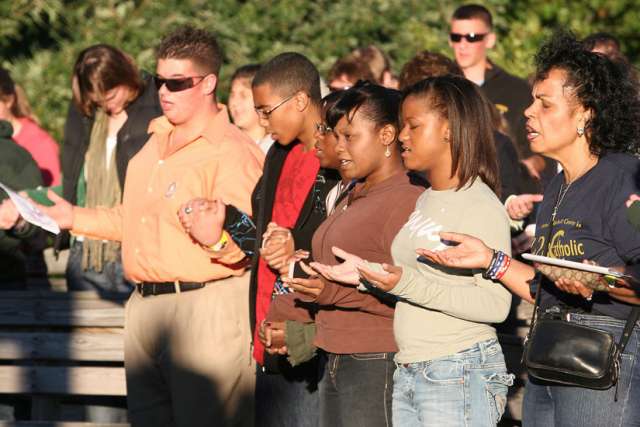My first job in a parish was exciting, fulfilling, lonely and bewildering. There was so much life. Joys, sorrows, pains and questions came in with the people who flocked through those doors. We may think parish attendance is down — statistically, it is — but from the shepherd’s point of view, there are more than enough sheep to care for.
That parish offered work to be done and life to be lived a-plenty. It was difficult to have friendships within the parish as an employee, tough to meet people outside parish life since my work hours were other people’s leisure time, and hard to find peers since fellow lay pastoral workers were rare. Yet this loneliness helped me understand others’ needs and the purpose of parish life.
I’d learned that the parish is the heart of Church life. But that parish taught me how the parish can and should be, a centre of life.
On June 21, we celebrate the parish feast day with a strawberry social — a whole day’s events featuring work (berry picking outings, baking, food preparation, cleaning and decorating), a festive meal, music, outdoor activities, a gathering of all ages at the church and liturgy. It is life shared. It shows that the purpose, and the real power, of a parish is to be a community.
The meaning of “community” has been lost, referring now to a random collection of individuals who happen to share a common characteristic. But this is not the Christian meaning. The community is those made one in the love of Christ, gathered around the Eucharist, becoming participants in divine life.
As such, it’s a place of resistance. It’s resistance to that which doesn’t give life; to all that would drive us back into isolation and loneliness; to the death-affirming spirit that abounds today. Parish allows people to experience real communion with others, not because they all agree on everything or share interests, but because they meet in the truth of who they are, which is, children of God.
“Don’t be conformed to this world,” Paul urges, “but be transformed by the renewing of your mind” (Romans 12:2).
That renewal is the meeting place the parish opens up for us, antidote to the illusions fostered by the Internet, media and social divisions.
We’re a community in worship, and in all that life’s about. My uncle, when consecrated bishop, became pastor of an urban parish. He quickly made a practice of working in his garden, which fronted a major intersection. The intended effect happened: people stopped and talked with him. He saw the parish as a centre not only of spiritual life, but of life.
This is the life we’re promised as Christians, available to all. Yet we can experience parish life as isolating, lonely, even hurtful. How could this be? Why are we “dead” in church? Why are we satisfied with that?
How harsh it is, how lonely we become, when our eucharistic communities are given over to something else — money-making, looking good, maintaining certain behaviours or ideals, self-preservation. We need to re-claim the practical, concrete place any eucharistic community has, and rediscover our spring of living water.
When we don’t feel our thirst for each other, when our parishes forget who they are, society creates structures to address the needs our churches have forgotten. Society would like to push the parish into the personal, private, spiritual realm (“religion is fine if it’s a personal choice that doesn’t affect anybody”). So we risk becoming irrelevant to our own people.
The early Church community, gathered for Eucharist, had fights about how to eat together. That’s because they were sharing life, physical as well as spiritual (see 1 Corinthians 11). Christ and the early Church never envisioned sending people away for their basic needs. “There is no need for them to go away; give them some food yourselves” (Matthew 14:16).
St. Aloysius Gonzaga (feast day June 21) gave his spirit to the parish dedicated to him. He went a different way from family expectations, rejecting his father’s splendour, wealth and constraints. He chose theological education, prayer and practical service through the Society of Jesus. At only 23, he died of the plague (Rome, 1591) because he’d served those suffering from it. He’s patron saint of youth, an unusual figure in our era that looks to things for solace and community, and to the wealthy for heroes. He understood that the Church is community gathered by Eucharist, to be fed body and soul, and to receive and give the real oneness that society can’t provide but its people deeply thirst for.
When we experience a parish as life-giving, as at the June strawberry social, it awakens a longing, a thirst, even a pain. We want more; we long for deeper connection. This is not bad, for it moves us — towards each other and towards abundant life.
(Marrocco can be reached at marrocco7@sympatico.ca.)


